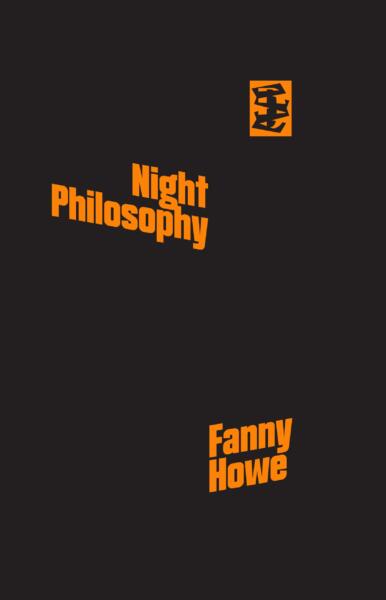“We are, in this sense, already in the other world.
We stream into it. Or out of it?”– Fanny Howe, Night Philosophy

Through citing herself alongside Hölderlin, the UN’s Rights of the Children and Ilona Karmel’s “Childhood War,” Fanny Howe’s Night Philosophy enacts a complex temporal movement that literarily reproduces the past in the present to a transformative and ongoing end. Ariana Reines describes Fanny Howe’s Night Philosophy as “a prism […] a manual for surviving evil,” and for a project that reaches back into Fanny Howe’s works (Night Philosophy’s “Once a Child” is an extremely whittled down version of Radical Love’s “Nod”) as much as it reaches towards more explicit materials with respect to “the dynamics of a child as victim in a desensitized era,” Howe generates a mutually enriching constellation of the poetic, the personal and the political. Further, Howe’s movement of synthesizing her own words, as in “Once a Child,” and repeating her own words, as in the case of “Bewilderment” being carried over in its entirety from The Wedding Dress into Night Philosophy, creates a multidirectional kind of streaming—where ideas from past texts gain new movements and meanings through their context in Night Philosophy, and where Night Philosophy is able to speak back to its many sources.
In an earlier blog post, I wrote about bewilderment in This Blue Novel. There, I discussed Howe’s philosophy of bewilderment as embodied by “women, children and subjugated people ‘who [rush] backwards and forwards within an irreconcilable set of imperatives.’” Night Philosophy performs this rushing, this streaming—where the “slipping center” between past and present is a vantage point only for “those who have little or no access to an audience of government” to then “[show] the weaknesses from the bottom up, the conspiracies, the lies, the plans, the false rhetoric.” The “slipping center,” the grey area, is a non-site for non-males. For such people, the past no longer represents a site of helplessness when held in tension with the present. Howe’s movement of bewilderment—back and forth both spatially and temporally—charges the instant with what has already been there. She writes: “Each movement forwards is actually a catching of what is coming at you.”
I read Night Philosophy several times before recognizing phrases from “Nod” in “Once a Child.” In the instant I sensed a connection between the two stories—at least a year after reading “Nod”—I leapt to my bookshelf, opened Radical Love, and scoured for the sentence: “She referred to her own libido as an inverted worm, whirling like a screw into the source of her being.” Even this image—the screw—echoes the spiraling of bewilderment. “Nod,” one of the most disturbing stories I’ve ever read, depicts sexual abuse within the family alongside abandonment, rape and murder. Two daughters—one idolized and one neglected—move through the grey areas their parents actively subject them to. I realized, re-reading “Nod,” that every sentence in “Once a Child” originated from this story. And there’s something in that non-immediate recognition of language—that moment I connected Night Philosophy to Divine Love (because, curiously, Howe doesn’t cite “Nod” in her appendix of sources)—that resonates with post-traumatic memory, the time-stunted realization that something has happened before.
While self-citation is just one part of Night Philosophy’s citational poetics, it has the most radical effect on the act of reading, especially when such text isn’t explicitly cited (as in “Once a Child”). The type of feverish movement I embodied through Howe’s self-citation—rushing to my bookshelf, searching through over a hundred pages from another book for recognizable lines—was that of bewilderment. I rushed “back and forth” across my office floor, turning pages, looking for connection between Howe’s texts. The page literally mobilized me. Howe writes: “There is a new relationship to time and narrative, when the approach through events and observations is not sequential but dizzying and repetitive.” Here, repetition renders new relation. Here, might Notley’s “beginning of the world” emerge? The forms of relation made possible through re-presenting one’s own work alongside similarly re-presented external sources, and the invitation to readerly relation yielded by citation, might be how we survive, how we move towards such a beginning.
AM Ringwalt is a writer and musician. Her words appear or are forthcoming in Jacket2, Black Warrior Review, Peripheries and the Washington Square Review. Called “unsettling” by NPR and “haunted” by The Wire, her newest record “Waiting Song” will be released on October 2, 2020. @amringwalt